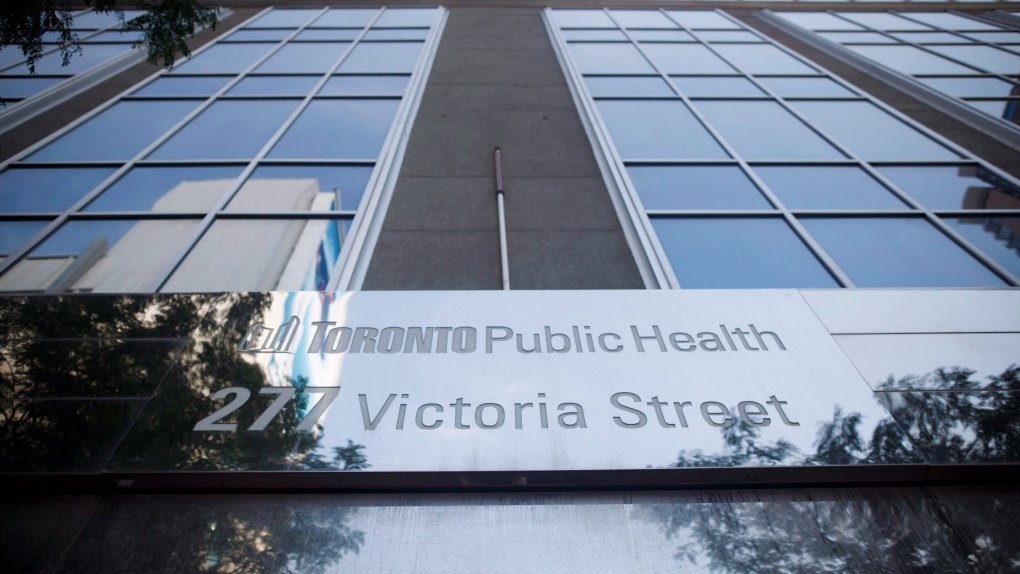Toronto's top doctor recommends decriminalizing possession of small amounts of illicit drugs
 Toronto Public Health's offices at Dundas and Victoria St. in Toronto is seen on Monday, August 21, 2017. THE CANADIAN PRESS/Cole Burston
Toronto Public Health's offices at Dundas and Victoria St. in Toronto is seen on Monday, August 21, 2017. THE CANADIAN PRESS/Cole Burston
Toronto’s medical officer of health is recommending that possession of small quantities of illegal drugs be decriminalized within the city’s geographical boundaries.
The recommendation, which will be presented to the city's board of health at a meeting next week, states that the city should pursue a federal exemption under the Controlled Drugs and Substances Act to decriminalize possession of small amounts of illegal drugs in Toronto.
“The status quo approach to the drug poisoning crisis is not working,” Dr. Eileen de Villa’s report to the board of health read.
“There is an urgent need for a comprehensive public health approach to drug policy that removes structural barriers to healthcare and social services, provides alternatives to the toxic drug supply, and enhances and expands services to improve the health and well-being of Toronto's communities.”
According to data released by the city, there were 531 confirmed drug overdose deaths in Toronto in 2020, marking an 81 per cent increase compared to 2019.
“If granted by Health Canada, this exemption would mean that people found in possession of drugs for personal use in Toronto would not be subject to criminal penalties,” the report read.
“All activities associated with drug trafficking, such as production and sale, would remain illegal and subject to the penalties under the Controlled Drugs and Substances Act.”
Toronto Public Health has already initiated a consultation process on moving forward to request the exemption within Toronto and the move has the support of the Toronto Police Service.
In a letter penned last week, Toronto Police Chief James Ramer said the police service, along with the national associations of chiefs of police, endorse the decriminalization of personal possession of illegal drugs.
“We agree that the current approach to managing drug use does not support safe communities or advance the health of people who use drugs,” the letter read.
“Decriminalization of the simple possession of all drugs- combined with the scale-up of prevention, harm reduction and treatment services- is a more effective way to address the public health and public safety harms associated with substance use.”
Toronto is not the first jurisdiction in Canada to make this request.
Both the City of Vancouver and the province of B.C. are seeking federal approval to decriminalize the possession of small amounts of illegal drugs.
“The Controlled Drugs and Substances Act is administered by Health Canada and establishes the legislative framework that regulates the possession, distribution, and sale of unregulated drugs in Canada,” de Villa,s report read.
“Under Section 56(1) of the Act, the Federal Minister of Health has the authority to exempt jurisdictions, including municipalities and provinces, from provisions of the Act that criminalize drugs if the Minister deems it necessary for a medical purpose or it is in the public interest.”
She noted that supervised consumption services have been permitted to operate in jurisdictions across the country using the federal authority.
The board of health will vote on the recommendation at its next meeting on Dec. 6.
CTVNews.ca Top Stories

5 rescued after avalanche triggered north of Whistler, B.C. RCMP say
Emergency crews and heli-skiing staff helped rescue five people who were caught up in a backcountry avalanche north of Whistler, B.C., on Monday morning.
Quebec fugitive killed in Mexican resort town, RCMP say
RCMP are confirming that a fugitive, Mathieu Belanger, wanted by Quebec provincial police has died in Mexico, in what local media are calling a murder.
Bill Clinton hospitalized with a fever but in good spirits, spokesperson says
Former President Bill Clinton was admitted Monday to Georgetown University Medical Center in Washington after developing a fever.
Trump again calls to buy Greenland after eyeing Canada and the Panama Canal
First it was Canada, then the Panama Canal. Now, Donald Trump again wants Greenland. The president-elect is renewing unsuccessful calls he made during his first term for the U.S. to buy Greenland from Denmark, adding to the list of allied countries with which he's picking fights even before taking office.
UN investigative team says Syria's new authorities 'very receptive' to probe of Assad war crimes
The U.N. organization assisting in investigating the most serious crimes in Syria said Monday the country’s new authorities were “very receptive” to its request for cooperation during a just-concluded visit to Damascus, and it is preparing to deploy.
Pioneering Métis human rights advocate Muriel Stanley Venne dies at 87
Muriel Stanley Venne, a trail-blazing Métis woman known for her Indigenous rights advocacy, has died at 87.
King Charles ends royal warrants for Ben & Jerry's owner Unilever and Cadbury chocolatiers
King Charles III has ended royal warrants for Cadbury and Unilever, which owns brands including Marmite and Ben & Jerry’s, in a blow to the household names.
Man faces murder charges in death of woman who was lit on fire in New York City subway
A man is facing murder charges in New York City for allegedly setting a woman on fire inside a subway train and then watching her die after she was engulfed in flames, police said Monday.
Canada regulator sues Rogers for alleged misleading claims about data offering
Canada's antitrust regulator said on Monday it was suing Rogers Communications Inc, for allegedly misleading consumers about offering unlimited data under some phone plans.

































